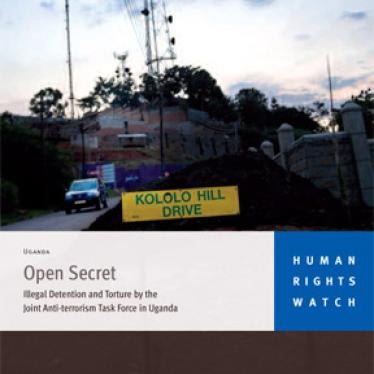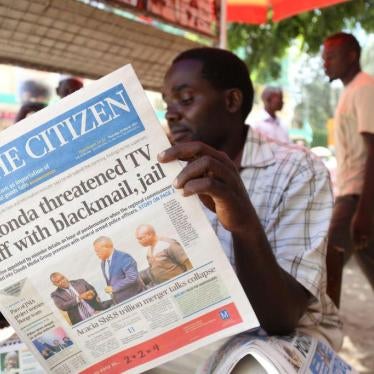(Kampala) – The Ugandan government should immediately release or bring to court Augustine Okello, a journalist from Lira-based Radio Rhino, who was forcibly disappeared on July 12, 2011, Human Rights Watch said today. Human Rights Watch expressed concern that security forces who disappeared Okello continue to deny him basic due process rights.
According to local sources who spoke to Human Rights Watch, Okello was last seen on July 12 in Lira, in northern Uganda. Lira’s district internal security officer (DISO), Steven Eryaku, had phoned Okello, and they met first at the police station and then later in the evening at the Grand Pacific Hotel in Lira. Since then, his phone has been switched off and he has not returned to his home or his work. Human Rights Watch and local journalists’ and human rights organizations have made multiple inquiries with police about Okello’s disappearance. For over a week, police and other government sources consistently denied knowledge of Okello’s whereabouts.
On July 22, Lt. Col. Felix Kulayigye, the Uganda military spokesman, told government-owned Rupiny Radio that Okello was in the hands of Uganda’s counterterrorism forces in Kampala. On July 23, the police inspector general, Gen. Kale Kayhiura, confirmed to Human Rights Watch that Okello “was arrested by the security and is to appear in court soon.” Okello’s precise location remains unknown.
“It’s completely unacceptable that Okello was forcibly disappeared by the government for 10 days while his family and friends anguished about his fate,” said Maria Burnett, senior Africa researcher at Human Rights Watch. “Okello should be released immediately or brought before court if the authorities have any credible charge against him.”
Under Uganda’s constitution, Okello has the right to be brought before court within 48 hours of his arrest. He should also be granted access to his family, a lawyer, and a doctor, as required both by Ugandan and international law.
Human Rights Watch has documented past instances of enforced disappearances and torture by Uganda’s counterterrorism forces, the Joint Anti-terrorism Task Force (JATT), a unit that draws its members from the military, police, and intelligence organizations and reports to the chief of military intelligence (CMI). JATT has no mandate in law and no powers to make arrests, other than by collaborating with police.
Five detainees – four men and one woman – who had been arrested on various dates in 2008 by JATT agents were finally released after being secretly detained for long periods of time, in one case over 16 months. Human Rights Watch has raised instances of long-term incommunicado detention without charge by JATT with the chief of military intelligence several times since 2009. In many cases, the people the task force held were released without charge, sometimes after months of incommunicado detention in undisclosed locations.
In some cases, families resorted to filing habeus corpus petitions to learn if their loved ones were dead or alive. In the cases of the five people who were eventually released in 2009, no charges were brought against them but they never appeared in court, as the High Court had ordered in response to the habeas petitions. Similarly, in 2008, JATT detained two South African nationals incommunicado in an undisclosed location for over 11 days and deported them on the day they were due in court after a habeas petition.
Under the International Convention for the Protection of All Persons from Enforced Disappearance, an enforced disappearance occurs when a person is deprived of his or her liberty, whether under arrest, detention, or otherwise, by state authorities, and the detention is followed by a refusal to acknowledge that deprivation of freedom or to give information on the fate or whereabouts of the detained person. The practice of “disappearances” is absolutely prohibited under international law and violates basic human rights, including the right to life, the right to liberty and security of the person, the right to a fair and public trial, as well as the prohibition on torture and cruel, inhuman, and degrading treatment or punishment.
“Ugandan military and civilian authorities should immediately stop using the tactic of enforced disappearances, which cause family and friends excruciating pain,” Burnett said. “Enforced disappearances are considered one of the most serious crimes under international law for good reason and have no place in a country that is suppose to respect the rule of law.”







